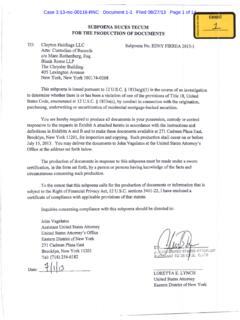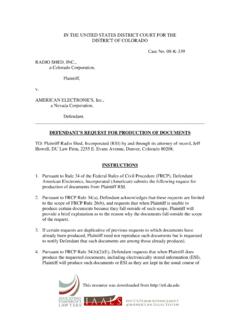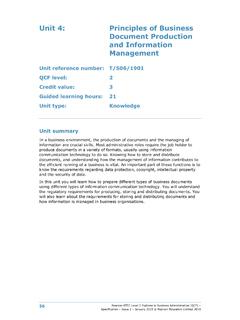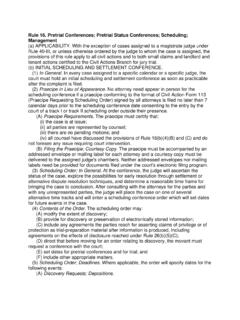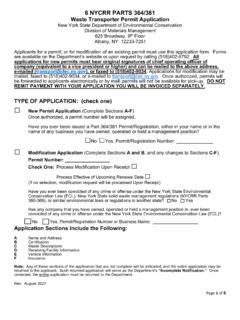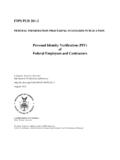Transcription of RULES OF CIVIL PROCEDURE - Alaska
1 Alaska RULES OF COURT 1 RULES OF CIVIL PROCEDURE Table of Contents PART I. SCOPE OF RULES CONSTRUCTION ONE FORM OF ACTION Rule 1 Scope of RULES Construction. 2 One Form of Action. PART II. COMMENCEMENT OF ACTION SERVICE OF PROCESS, PLEADINGS, MOTIONS AND ORDERS 3 Commencement of Action and Venue. 4 Process. (a) Summons Issuance. (b) Summons Form. (c) Methods of Service Appointments to Serve Process Definition of Peace Officer. (d) Summons Personal Service. (1) Individuals. (2) Infants. (3) Incompetent Persons. (4) Corporations or Limited Liability Companies. (5) Partnerships. (6) Unincorporated Associations. (7) State of Alaska . (8) Officer or Agency of State. (9) Public Corporations.
2 (10) Unknown Parties. (11) Officer or Agency of State as Agent for Non-governmental Defendant. (12) Personal Service Outside State. (13) Personal Service in a Foreign Country. (e) Other Service. (1) Diligent Inquiry. (2) Service by Posting on the Alaska Court System s Legal Notice Website. (3) Additional Service by Other Methods. (4) Mailing Required. (5) Form and Contents of Notice Time. (6) Proof of Service. (f) Return. (g) Amendment. (h) Service of Process by Mail. (i) [Reserved] (j) Summons Time Limit for Service. 5 Service and Filing of Pleadings and Other Papers. (a) Service When Required. (b) Service How Made. (c) Service Numerous Defendants. (d) Filing. (e) Filing With the Court Defined.
3 (f) Proof of Service. (g) Service After Final Judgment. (h) Service on Custody Investigator and Guardian Ad Litem. (i) Changes in Addresses and Telephone Numbers. Filing and Service by Facsimile Transmission and Electronic Mail. (a) Filing by Facsimile Transmission and Electronic Mail. (b) Filing Foreign Domestic Violence Protective Orders by Facsimile Transmission. Alaska COURT RULES 2 (c) Service by Facsimile Transmission and Electronic Mail. (1) Application of this Rule. (2) Method of Service. (3) Consent to Service. (4) Page Limit. (5) When Service is Complete. (6) Proof of Service. Foreign Orders and Judgments. (a) Notice of Registration of Support and Child Custody Orders.
4 (b) Notice of Filing Foreign Judgments. (c) Confidentiality of Social Security Numbers. (d) Service of Motions, Petitions, and Complaints to Enforce or Modify Registered Support and Child Custody Orders. (1) Support Orders. (2) Child Custody Determinations. Electronic Distribution by the Court. (a) When Allowed. (b) E-Mail Addresses. (1) Attorneys. (2) Agencies and other entities. (3) Guardians Ad Litem, Court Visitors, and Custody Investigators. (4) Self-Represented Parties. (5) Changes to e-mail addresses. (c) Time for Response. (d) Certified Documents. (e) Standards. 6 Time. (a) Computation. (b) Enlargement. (c) Additional Time after Service or Distribution by Non-Electronic Mail.
5 PART III. PLEADINGS AND MOTIONS 7 Pleadings Allowed Form of Motions. (a) Pleadings. (b) Motions and Other Papers. (c) Demurrers, Pleas, etc., Abolished. 8 General RULES of Pleading. (a) Claims for Relief. (b) Defenses Form of Denials. (c) Affirmative Defenses. (d) Effect of Failure to Deny. (e) Pleading to Be Concise and Direct Consistency. (f) Construction of Pleading. 9 Pleading Special Matters. (a) Capacity. (b) Fraud, Mistake, Condition of the Mind. (c) Conditions Precedent. (d) Official Document or Act. (e) Judgment. (f) Statutes and Ordinances. (g) Time and Place. (h) Special Damage. 10 Form of Pleadings. (a) Caption Names of Parties. (b) Paragraphs Separate Statements.
6 (c) Adoption by Reference Exhibits. (d) Title of Pleading Citation of Statute. RULES OF CIVIL PROCEDURE 3 CR (e) Conformity With Rule 76. 11 Signing of Pleadings, Motions, and Other Papers. 12 Defenses and Objections When and How Presented By Pleading or Motion Motion for Judgment on Pleadings. (a) When Presented. (b) How Presented. (c) Motion for Judgment on the Pleadings. (d) Preliminary Hearings. (e) Motion for More Definite Statement. (f) Motion to Strike. (g) Consolidation of Defenses in Motion. (h) Waiver or Preservation of Certain Defenses. 13 Counterclaim and Cross-Claim. (a) Compulsory Counterclaims.
7 (b) Permissive Counterclaims. (c) Counterclaim Exceeding Opposing Claim. (d) Counterclaim Against the State. (e) Counterclaim Maturing or Acquired After Pleading. (f) Omitted Counterclaim. (g) Cross-Claim Against Co-Party. (h) Joinder of Additional Parties. (i) Separate Trials Separate Judgment. 14 Third-Party Practice. (a) When Defendant May Bring in Third Party. (b) When Plaintiff May Bring in Third Party. (c) Equitable Apportionment. 15 Amended and Supplemental Pleadings. (a) Amendments. (b) Amendments to Conform to the Evidence. (c) Relation Back of Amendments. (d) Supplemental Pleadings. (e) Form. 16 Pretrial Conferences; Scheduling; Management. (a) Pretrial Conferences; Objectives.
8 (b) Scheduling Order. (c) Subjects for Consideration at Pretrial Conferences. (d) Final Pretrial Conference. (e) Pretrial Orders. (f) Sanctions. (g) Actions Exempted from Rule 16 (b). Special procedures for Reducing Litigation Delay. (Rescinded). Informal Trials in Domestic Relations Cases. PART IV. PARTIES 17 Parties Plaintiff and Defendant Capacity. (a) Real Party in Interest. (b) Capacity to Sue or be Sued. (c) Infants or Incompetent Persons. (d) Unknown Parties. 18 Joinder of Claims and Remedies. (a) Joinder of Claims. (b) Joinder of Remedies Fraudulent Conveyances. 19 Joinder of Persons Needed for Just Adjudication. (a) Persons to Be Joined if Feasible. (b) Determination by Court Whenever Joinder Not Feasible.
9 (c) Pleading Reasons for Nonjoinder. (d) Exception of Class Actions. Alaska COURT RULES 4 20 Permissive Joinder of Parties. (a) Permissive Joinder. (b) Separate Trials. 21 Misjoinder and Non-Joinder of Parties. 22 Interpleader. 23 Class Actions. (a) Prerequisites to a Class Action. (b) Class Actions Maintainable. (c) Determination by Order Whether Class Action to Be Maintained Notice Judgment Actions Conducted Partially as Class Actions. (d) Orders in Conduct of Actions. (e) Dismissal or Compromise. Derivative Actions By Shareholders. Actions Relating to Unincorporated Associations. 24 Intervention. (a) Intervention of Right. (b) Permissive Intervention. (c) PROCEDURE .
10 25 Substitution of Parties. (a) Death. (b) Incompetency. (c) Transfer of Interest. (d) Public Officers Death or Separation from Office. PART V. DEPOSITIONS AND DISCOVERY 26 General Provisions Governing Discovery; Duty of Disclosure. (a) Required Disclosures; Methods to Discover Additional Matter. (1) Initial Disclosures. (2) Disclosure of Expert Testimony. (3) Pretrial Disclosures. (4) Form of Disclosures. (5) Methods to Discover Additional Matter. (b) Discovery Scope and Limits. (1) In General. (2) Limitations. (3) Trial Preparation: Materials. (4) Trial Preparation: Experts. (5) Claims of Privilege or Protection of Trial Preparation Materials. (c) Protective Orders.

